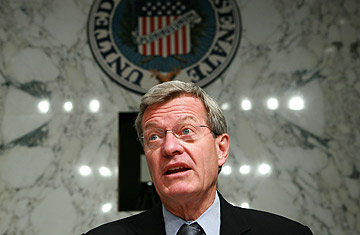
Senate Finance Committee chairman Max Baucus speaks during a markup on Capitol Hill
Since the end of last week, Democrats on Capitol Hill had been nervously awaiting the verdict from the Congressional Budget Office (CBO) on the Senate Finance Committee's health-care bill. No one has to remind them that the number crunchers on Capitol Hill can have a major impact on such a complicated debate. The beginning of the end of Bill Clinton's effort to transform the health-care system probably came in February 1994, when the nonpartisan CBO issued a 92-page report declaring that the President's health-care plan would cost billions more than the Administration had estimated and amount to a government takeover of the health-care system.
So there was palpable relief among Senate Democratic leaders on Wednesday when the CBO gave a qualified thumbs-up to the health-care bill, which most observers think has the best chance of reaching President Obama's desk. According to the CBO's preliminary analysis, the amended version of the bill that is expected to pass the Senate Finance Committee Oct. 13 would reduce the projected deficit by more than $81 billion over the next decade (up from an estimate of $49 billion over 10 years in the earlier version of the bill). That means it would fulfill Obama's insistence that health reform not add to the Federal Government's red ink over the next decade. "The report is good news," said Senate Finance Committee chairman Max Baucus. "Our balanced approach in the Finance Committee to health reform, I think, has paid off once again."
In the longer haul, CBO director Douglas Elmendorf wrote, it becomes harder to predict, because "the uncertainties involved are simply too great." Among those uncertainties is the fact that Congress is likely to modify the law over the years. But ultimately, he noted, the CBO expects that revamping the health-care system could produce even greater savings beyond the 10-year time frame.
Where the bill falls notably short is on the other part of Obama's pledge, which was to make sure that every American had health coverage. The CBO estimates that the Finance Committee bill would reduce the number of uninsured by 29 million, leaving more than 16 million Americans (and an additional 9 million illegal immigrants) without. (This is roughly the same as in the original version of the bill, which was introduced last month by Baucus before it was amended during the markup process.) That means 94% of legal residents would have coverage, which is a significant improvement over the 83% who now have it. However, 97% would be covered under the most costly version of the legislation that is under consideration in the House.
And because the CBO confines its analysis to the impact the legislation would have on the Federal Government's bottom line, it was silent on one question that is among the greatest concerns of the vast majority of Americans who already have coverage: What effect would the legislation have on overall health-care costs, particularly the price of private insurance?
Some health experts say the latest version of the committee's bill could actually put upward pressure on the cost of private insurance. That is because the committee weakened a provision that would require Americans who do not have coverage through their employer or through government programs like Medicare and Medicaid to go out and purchase it. The softening of that requirement stemmed from the growing concerns of a number of lawmakers — particularly Senator Olympia Snowe of Maine, the lone Republican who might actually vote for the bill — that the requirement would put a financial burden on many middle-income Americans that they simply could not afford.
Where the original version of the bill would have allowed people to opt out of the so-called individual mandate if the cost of coverage exceeded 10% of their income, the latest version lowers that threshold to 8%. Jonathan Gruber, a health economist at the Massachusetts Institute of Technology, estimates that will mean 3 million fewer people will buy health insurance. "That's bad," he says, "but I don't think it's catastrophic."
More problematic, he says, is the fact that the new version of the bill would impose lower fines than the original draft on those who are not exempt from the mandate but who choose not to buy insurance anyway; indeed, the CBO estimates that the penalties will now bring in about $4 billion over 10 years, down from an original projection of $20 billion. That reduction in fines, Gruber says, is like saying "we think taxes are too high, so we're going to encourage you to cheat." The result, he fears, is that the new insurance marketplaces created under the legislation will be crowded with sick people, who are expensive to insure, while relatively inexpensive healthy people stay away. And that, Gruber warns, would probably result in higher premiums for everyone.
